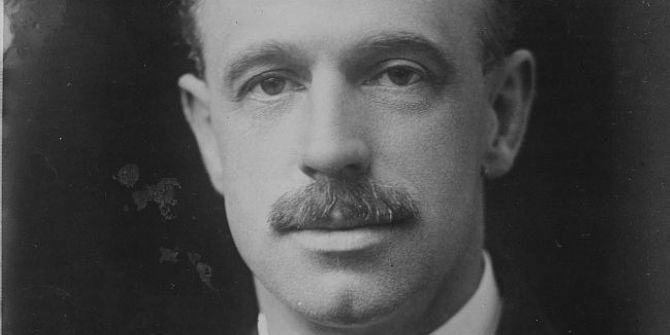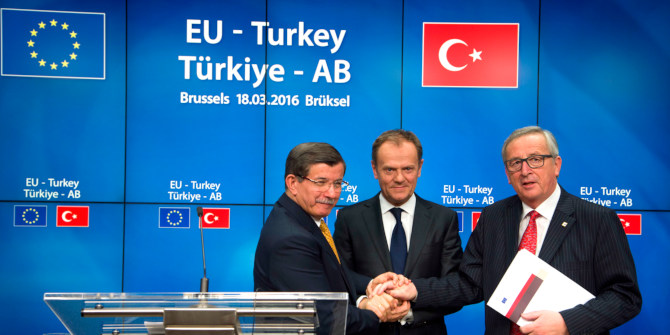The British and French governments have traded accusations of blame following the deaths of 27 people who drowned while trying to cross the English Channel. Louise Ryan and Maria Lopez argue that above all we must remember that those who died were not simply ‘migrants’, but human beings with their own stories and potential contributions to make to British society.
On 24 November, reports of the ‘drowning of 27 migrants’ in the English Channel made headlines across the UK. The incident came amid record numbers of asylum seekers attempting to cross the Channel and further highlighted the dehumanisation and objectification of migrant ‘bodies at borders’.
The British government steadfastly refuses to take responsibility, instead pointing the finger of blame at the French for failing to stop people smugglers operating on the beaches near Calais. Meanwhile, the Home Secretary, Priti Patel, has promised ‘operational solutions’ which could mean the highly dangerous strategy of forcing flimsy, overloaded boats to turn around at sea and return to France.
The fact that smugglers charge people £3,000 each to cross the Channel is widely reported in the British press. But voices asking why people are willing to pay such extortionate amounts of money and risk their lives in little more than inflatable dinghies are given far less space in public discourse. The voices of migrant organisations are usually shouted down by indignant politicians claiming the moral high ground and proudly asserting their concern to protect ‘vulnerable migrants’ from ‘evil traffickers’. However, the widespread outpouring of sadness from politicians at these recent deaths, and the vociferous condemnation of the nefarious trade in people smuggling, do little to tackle the underlying causes of this phenomenon.
The recent drownings in the Channel are not an isolated incident. More than 25,700 people have made the dangerous journey to the UK in small boats this year – more than three times the 2020 total. Over the last 20 years, almost 300 asylum seekers, including 36 children, have died trying to cross the Channel to the UK. Under the UK government’s ‘hostile environment’ policy, many legal immigration routes have been closed and the rights of asylum seekers have been severely curtailed.
Brexit and the Windrush scandal have underlined the hardening of anti-immigrant rhetoric and policies. Against this backdrop, it was widely predicted that we would see more dead bodies in the Channel. The increasing number of people attempting to cross the Channel in small boats in recent years appears to be linked to the closing down of other routes. Thus, far from tackling a dangerous migration process, the British government’s actions seem to be feeding this route.
Elsewhere in the world, similar anti-immigrant and anti-refugee policies are leading to countless deaths of people desperate to flee poverty, violence and exploitation. In the Mediterranean, there have been thousands of fatalities as migrants risk the treacherous crossing in tiny boats. While politicians blame people smugglers and gangs of human traffickers, the wider geopolitical contexts of such migrations are usually ignored. The so-called ‘weaponisation of migration’ is apparent in recent events on the Polish-Belarusian border as hundreds of asylum seekers have found themselves trapped between rival groups of armed soldiers.
These border hotspots exemplify a specific form of government rhetoric, policy and practice that vilifies migrant people, containing and regulating their bodies and silencing their voices. Such actions can be analysed as a form of ‘necropolitics’, a concept introduced by the Cameroonian philosopher Achille Mbembe to explain power relations in societies where criminal and state violence act as regulatory weapons of death and in which people become ‘living dead’. Mbembe argues the politics of death (necropolitics) exists when governments decide who may live and who may die. While necropolitics has been associated with particularly violent hotspots such as the Mexican/US border, aspects of necropolitics are apparent in British government policy towards migrants and asylum seekers.
Fixing the asylum process, making it fairer and faster, and allowing applicants to work is not only the right thing to do, but would also make sound economic sense.
In public discourse in the British media and among politicians, migration is presented in negative terms as a threat to the sovereignty and stability of a nation-state that seeks to ‘take back control’ of its borders. It is implied that the country is being overrun or swamped by hordes of migrants when, among European countries, Britain accepts far fewer refugees than Germany or France. In fact, the numbers of asylum seekers who manage to travel to Europe represent only a small minority of refugees worldwide. The countries with the largest proportion of refugees are mainly outside of Europe. Lebanon, Jordan and Turkey have the most refugees per head of population.
The language of ‘migrants’ also misrepresents these people because, upon arrival in Britain, the vast majority claim and are eventually granted asylum. As their applications for asylum are clearly legitimate, according to the Home Office’s own data, it would undoubtedly make more sense legally, financially and ethically to offer safer application routes.
However, entering the British asylum application process is far from the end of the story. Indeed, this is a tortuously slow and protracted process as the Home Office back log continues to grow. Moreover, as asylum seekers are not allowed to work, such long delays in the application process can result in years of poverty and uncertainty. Rather than investing millions to police the beaches, the UK would be better served by increasing the resources assigned to the asylum application process.
This brings to light a central inconsistency and contradiction in British government policy. Since Brexit, there has been a notable reduction in migrants entering the country. One consequence of Britain’s post-Brexit policies has been severe labour shortages across many sectors of the economy. In typical piecemeal fashion, and with a failure to admit that the system post-Brexit is not working, the government has responded with a proliferation of short-term visas and work permits in sectors like road haulage. The fact these short-term visas have proven so unpopular is evidence they are not fit for purpose.
In attempting to please particular political constituencies, the government has tied itself in knots when to comes to immigration. The number of EU migrants entering the UK has plummeted and there are huge numbers of job vacancies. Meanwhile, thousands of people are so desperate to come to Britain that they are risking their lives in the Channel. The solution seems glaringly obvious. Fixing the asylum process, making it fairer and faster, and allowing applicants to work is not only the right thing to do, but would also make sound economic sense. And in doing so, the government would in one stroke cut off the demand that fuels people smuggling.
Note: This article gives the views of the authors, not the position of EUROPP – European Politics and Policy or the London School of Economics. Featured image credit: Geoffroy Hauwen on Unsplash





This might need some discussions around controversial questions of policies aimed at simple ‘economic integration’, as discussed in Martin Ruh’s work -https://archive.discoversociety.org/2019/03/06/when-will-they-integrate/